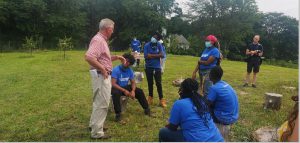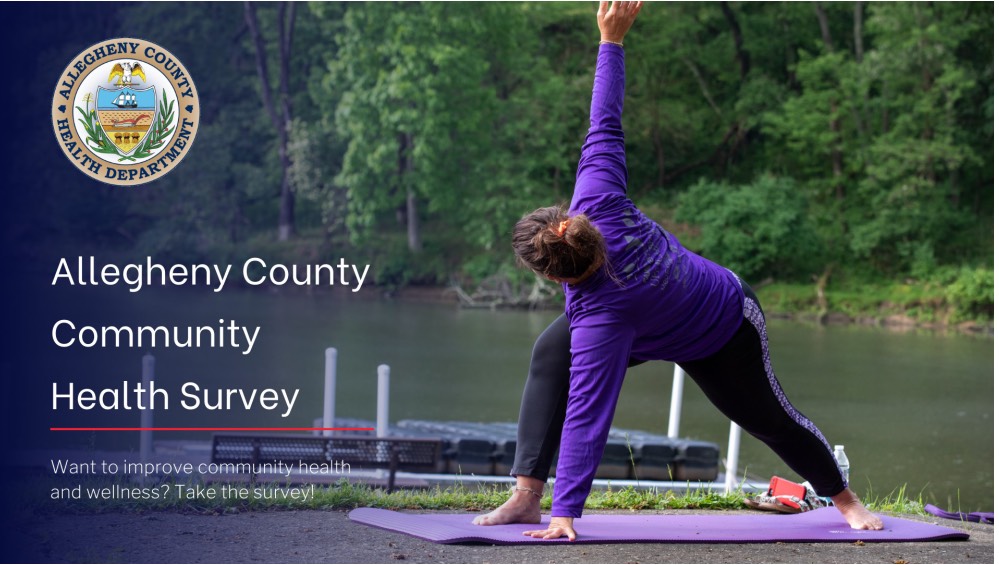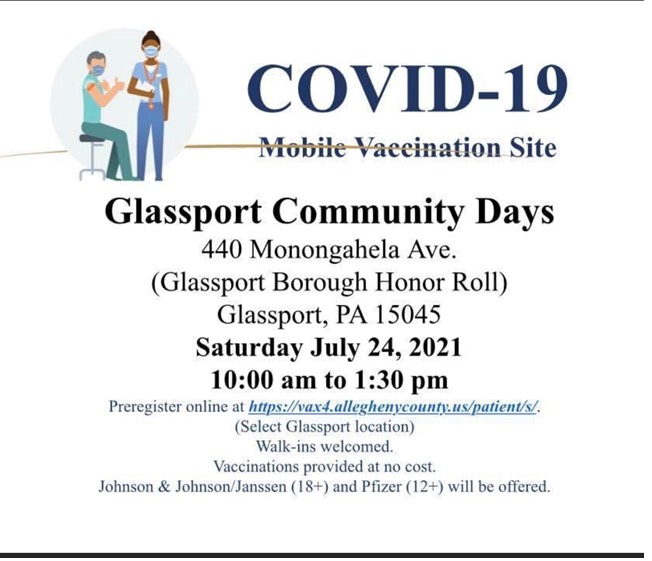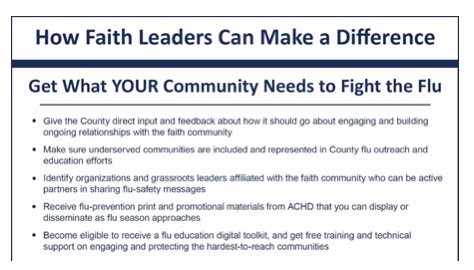This is the latest Live Well Allegheny e-update. Please find a variety of information that will be helpful to you in your efforts and can also be shared within your own networks. As always, you can find a great deal of information on our website, including our Partner Resources.
We now have 214 community partners, 68 municipalities, 53 restaurants, 33 workplaces and 18 school districts united in our efforts to make Allegheny County healthy for all!
Be sure to like and follow the Allegheny County Health Department on Facebook and Twitter to stay up-to-date on all ACHD news.
A Letter From Our Director
Greeting from the Director’s Corner.
This month I will talk about an issue close to my heart: World Breastfeeding Week.
But first, the delta variant. As I stated Wednesday in my COVID-19 update, the delta variant in combination with many unvaccinated people has resulted in this new wave of cases. The delta variant is significantly more contagious than other forms of the virus and is more likely to cause severe disease. In parts of the country with low vaccination rates, hospitals are again full of people with severe COVID-19 illness. Most of those in hospitals around the country are not vaccinated. This is heartbreaking as we have the capacity to prevent most of these hospitalizations if more of our friends, neighbors and loved ones get vaccinated. Give the virus an opening, and it will enter. Unfortunately, we are giving it an opening. So please, go get vaccinated! (To read the full update, click this link.) The vaccines are far, far safer than having COVID itself and they are very effective!
 Next: World Breastfeeding Week is Aug. 1-7.
Next: World Breastfeeding Week is Aug. 1-7.
For more than 20 years as a local pediatrician, I helped women meet their chest/breastfeeding goals. As a medical educator, I helped train healthcare professionals to better support chest/breastfeeding. As a clinical researcher, I conducted research to inform and advance the science of human milk and infant feeding, growth and development. Together these experiences have only reinforced to me the importance of human milk and chest/breastfeeding for the health of children, birthing persons, and society.
Human milk provides all the nutrients a baby needs for growth and development. But human milk is far more than just nutrients – it contains over 4000 bio-active components, many for which we do not yet understand their role. We do know that human milk contains many components that protect the infant from infection – including antibodies, white blood cells, and oligosaccharides that bind viruses and bacteria in the gut. Human milk promotes brain development and reduces the risk of a host of common diseases, like ear infections, urine infections, asthma and eczema. The American Academy of Pediatrics (AAP) and the World Health Organization (WHO) recommend that infants be fed only human milk for the first six months of life. From the age of 6 months on, infants should begin eating safe and adequate iron-rich complementary foods while continuing to receive human milk for up to at least 1 (AAP) or 2 years (WHO) and beyond!
Chest/breastfeeding is an integral component of the reproductive process and thus has important health implications for the birthing person. The body prepares for infant feeding starting early in pregnancy as it grows the ductal system to produce milk. Individuals who do not chest/breastfeed after a pregnancy have higher rates of cardiovascular disease as they age than women who do. They also have higher rates of breast and ovarian cancer.
From a societal standpoint, human milk is free, easily accessible, and greatly reduces healthcare costs for both members of the mother/child dyad. Simply put, chest/breastfeeding gives your child the best start to life possible in terms of development and nourishment. And it helps mothers/birthing person in numerous ways.
Although chest/breastfeeding is natural and important – it is often challenging – especially early on. It is imperative parents receive expert and timely help and advice and that, as a society, we offer support through family-friendly policies. Did you know that there is federal law which requires employers to provide reasonable break time for an employee to express breast milk for the nursing child for one year after the child’s birth? You can find out more information here.
ACHD supports chest/breastfeeding in many ways, including home visiting programs, WIC, AC Breastfeeding Help Line (412-687-2243), and the Allegheny County Breastfeeding Coalition (ACBC) . The PA Breastfeeding Coalition maintains a list of resources to support breast/chest-feeding families in the state which can be found here.
For World Breastfeeding Week and year-round, the Women, Infants and Children (WIC) Program provides education on the benefits of breastfeeding. The Health Department has operated the program continuously in Allegheny County since 1974 and our dedicated WIC employees do a wonderful job of providing resources to meet new mothers’ needs. To learn more about WIC, click here. And to learn more about the ACHD’s Breastfeeding Friendly Place Awards—winners will be announced during World Breastfeeding Week—click here.
Have a great summer, everyone. Be safe and be kind.
Dr. Debra Bogen
Director, Allegheny County Health Department

Health Observances


Pennsylvania Urban Agriculture Week
PA Urban Agriculture Week was July 19-24th. To celebrate, the PA Secretary of Agriculture Russell Redding and members of his staff visited four local community growing sites in the city. The public is invited to tour of 6-7 community garden sites on Saturday, July 24th. For more information, or to sign up, go the link here.
What’s Happening in Public Health
 The Allegheny County Health Department is building on its 2019 health survey to understand health priorities and concerns as part of its next Community Health Assessment. Participate through this online survey today.
The Allegheny County Health Department is building on its 2019 health survey to understand health priorities and concerns as part of its next Community Health Assessment. Participate through this online survey today.
The survey is accessible online in English and Spanish here. The survey supplement is open to people who live in Allegheny County and who are 18 years of age or older. The survey is open through July 31.
Partner Information & Opportunities

Glassport Community Day – July 24th
Use this link to preregister online today!
Red Lantern Small Bike Giveaway –
Sunday, July 25th 10 am – 12 pm


Green Tree Borough Hosts Bike Rodeo
Green Tree Borough, a Live Well Community, hosted a Bike Rodeo on July 10. The ACHD Chronic Disease and Injury Prevention Department attended and provided bicycle helmet fitting advice as well as other bicycle safety pamphlets to participants.

Allegheny County Health Department is Engaging Faith Communities to Prepare for the Upcoming Flu Season

The Allegheny County Health Department (ACHD) has commissioned MEE Productions Inc. to increase engagement of the faith-based community in order to protect local Black residents from negative health impacts related to the seasonal flu. The project includes listening sessions to understand the potential impact and the communication needs of faith-based leaders.
ACHD has received funding from the CDC to prevent chronic diseases and address health disparities among African-American communities in Allegheny County via the REACH program, which promotes optimal health and living well. These geographic areas are being prioritized:
- East End (East Hills, Garfield, Homewood, Larimer, Lincoln-Lemington-Belmar, Wilkinsburg)
- Hill District
- Mon Valley (Clairton, North Versailles, Duquesne, McKeesport, North Braddock, Rankin)
- Northside

We are pleased to collaborate once again with respected Pittsburgh faith-based community leader Reverend Dr. John Welch, who has a PhD in healthcare ethics and for the past 15 years has been organizing faith communities. Dr. Welch will partner with MEE in this much-needed culturally relevant outreach effort.
Together, we hope to understand how a broad cross-section of faith-based individuals and organizations in the county can be empowered and leveraged to keep our communities informed and activated about the flu. This includes limiting the devastating effects of the flu in the Black community, especially among our seniors. We want to build upon and leverage the trust and ongoing relationships that our faith leaders have with their congregants and with the broader community. This trust is essential in being able to have conversations and share information about flu vaccinations and related precautions, especially given the deep-seated barrier of community mistrust when it comes to health and healthcare institutions. ACHD can be more aware of and responsive to community needs by working directly with the faith community.
Use the links below to register!
Tuesday, July 27, 2021 at 1:00 pm
Wednesday, July 28, 2021 at 11:00 am
Wednesday, July 28, 2021 at 3:00 pm
Thursday, July 29, 2021 at 6:00 pm



All of Us Pennsylvania is a partner of the All of Us Research Program, an exciting new initiative from the National Institutes of Health (NIH). The mission is simple: To speed up health research and medical breakthroughs.
The Precision Medicine Initiative examines influential factors of human health and empowers participants through health literacy and research participation. All of Us aims to speed up health research and medical breakthroughs by creating a database of health information provided by participants from various backgrounds.
Completion of the the enrollment process take ~1.5 hours with about 45 minutes of consent videos/surveys online followed by a (scheduled/walk-in) 20-minute clinic visit for body measurements + biospecimen samples. Participants are reimbursed with a $25 gift card before they leave as well as bus passes for their commute, a certificate of completion, and current body measurements/blood pressure readings.
All of Us Pennsylvania is now safely seeing participants in a handful of locations in Allegheny County.
For more information visit: https://joinallofuspa.org
Live Well Allegheny Story
Earn Food Bucks for more food at local Farmers Markets
 The Food Trust’s Food Bucks program, in partnership with Just Harvest and the Greater Pittsburgh Community Food Bank, gives shoppers $2 in food bucks coupons for every $5 spent in food stamps. Launched in 2010, and originally only available in Philadelphia, this healthy food incentive program has expanded to a statewide initiative, with a focus on the Pittsburgh region and western Pennsylvania. The Food Bucks program is offered in over 50 retail settings, including farmers markets, mobile markets, corner stores and supermarkets.
The Food Trust’s Food Bucks program, in partnership with Just Harvest and the Greater Pittsburgh Community Food Bank, gives shoppers $2 in food bucks coupons for every $5 spent in food stamps. Launched in 2010, and originally only available in Philadelphia, this healthy food incentive program has expanded to a statewide initiative, with a focus on the Pittsburgh region and western Pennsylvania. The Food Bucks program is offered in over 50 retail settings, including farmers markets, mobile markets, corner stores and supermarkets.
The Food Bucks program allows Supplemental Nutrition Assistance Program (SNAP), commonly referred to as food stamps, benefit holders to stretch their budgets to include fresh, healthy, and local fruits and vegetables.
Visit The Food Trust to explore a map to see where, when and how you can earn Food Bucks to purchase fruits and vegetables, and watch the video below to learn more about the Food Bucks program.
Farmers markets, corner stores, supermarkets or other retailers serving SNAP-eligible populations can apply to distribute Food Bucks by contacting Emily Schmidlapp at [email protected] or 215-575-0444, ext. 5178.
